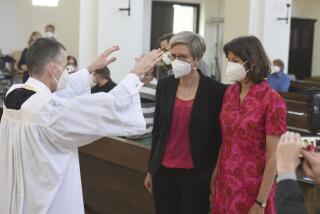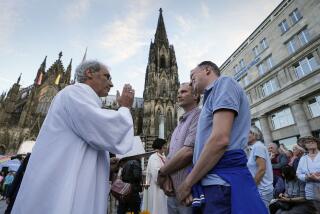More Dioceses Delay Confirmation Rite : Faith: The sacrament may be administered at age 7. But delaying it until high school emphasizes maturity and prolongs youths’ religious instruction.
- Share via
INDIANAPOLIS — The generation before them may have celebrated Confirmation in elementary school, but a group of teen-agers at a Catholic youth center here were glad they waited until high school.
“Even as a junior, I thought a lot about (whether) I really want to take the church’s beliefs as my own,” said 18-year-old Brenda Vansickle of Greenfield, Ind.
The teen-agers in the archdiocese of Indianapolis are part of a growing number of Catholic youths who are required to wait until high school before celebrating what many consider the final sacrament of initiation into the faith.
Dioceses across the country have pushed back the age of Confirmation as they emphasize the maturity the confirmands need to commit themselves to the faith.
The church also is sensitive to the reality that although it teaches that Confirmation is a sacrament that bestows the gift of the Holy Spirit, some youths view it as a graduation exercise from religious education.
As some dioceses try to hold on to youths with later Confirmation dates, a small but growing number of dioceses have reverted to what they say is the traditional church practice of combining First Communion and Confirmation, and are confirming youths as early as age 7.
The variety in Confirmation dates is reflected in a proposal before the National Conference of Catholic Bishops at its June 17-19 meeting in New Orleans to allow the age of discretion to vary from “about the age of 7” to 18.
The Roman Catholic Church is not the only denomination addressing Confirmation practices.
The Rev. Clayton Morris said there is a movement in the Episcopal Church toward seeing “what used to be Confirmation as a repeatable rite of reaffirmation” of faith.
“In the past, we’ve found Confirmation and Confirmation class is a kind of exit visa,” said Morris, of the church’s liturgy office.
In the Evangelical Lutheran Church in America, where studies have shown there is about a 50% drop-off in religious education attendance after Confirmation, the dates of Confirmation in general have been gradually pushed back from about eighth or ninth grade prior to 1970 to ninth or 10th grade today.
Historically, there is little evidence of pastoral practices regarding children in the early church, but adults were usually baptized, confirmed and received the Eucharist for the first time in the same ceremony, often held on the Easter vigil.
By the 6th Century, infant baptism was a normal practice and the sacraments were separated. The traditional order remained baptism, Confirmation and Eucharist, but there has not been a universal observance of the order in the Western church for the last 1,000 years, said the Rev. Michael Walsh, former executive director of the Secretariat for Pastoral Research and Practices of the U.S. Catholic Conference.
Since the Second Vatican Council in the early 1960s, there has been a general move to delay confirmation into adolescence, and emphasize in practice that the rite should be administered to those ready to make a mature commitment of faith.
Some dioceses that previously routinely confirmed youths in the fifth or sixth grades now may require them to wait until their senior year in high school. In a survey of Catholic bishops, a third said the age range for Confirmation should be limited to 15 to 18, while 27% said the age range should be 12 to 18.
Left largely unspoken in the debate is that the push for later Confirmation dates is also motivated by the desire to keep Catholic youths in religious education programs, according to church officials.
“I don’t know if anyone would admit that but, practically, yes,” said Bishop Emil Wcela, chairman of the Ad Hoc Committee for the Canonical Determination of the Age of Confirmation.
Even as most dioceses set later ages for Confirmation, a half-dozen dioceses are leading a movement the other way, going back to having Confirmation before First Communion, which is usually celebrated around the second grade.
Those dioceses claim to be recapturing early church practice and being more faithful to the theology of the sacrament, which is viewed by the church as bestowing the gift of the Holy Spirit in a special way.
More to Read
Sign up for Essential California
The most important California stories and recommendations in your inbox every morning.
You may occasionally receive promotional content from the Los Angeles Times.













